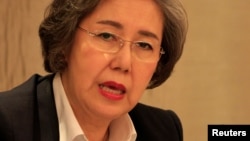A United Nations human rights investigator on Friday criticized Myanmar's crackdown on the Rohingya Muslim minority and urged the military to respect the law and human rights.
Authorities say the military launched a security sweep in response to what they say was an attack in October by Rohingya insurgents on border posts near Myanmar's border with Bangladesh in which nine police officers were killed.
Since then, at least 86 people have been killed and the United Nations says at least 65,000 Rohingya have fled to Bangladesh.
Accusations denied
Residents and refugees accuse the military of killing, raping and detaining civilians while burning villages in northwestern Rakhine State.
The government, led by Nobel Peace Prize winner Aung San Suu Kyi, denies the accusations and insists a lawful counter-insurgency operation is underway.
“It would be particularly important for the security forces to always act within the parameters of the rule of law and in compliance with human rights,” Yanghee Lee, the U.N. Special Rapporteur on Human Rights in Myanmar, said at the end of a visit to the country.
Claims 'quite incredible'
Lee said she found government claims that the Rohingya have burned their own houses “quite incredible” and suggested that recent footage of police beating Rohingya villagers could be “not an isolated incident, but a more common practice.”
Suu Kyi, a former political prisoner and champion of democracy in then military-ruled Myanmar, came to power last April after a landslide election win, installing her confidant, Htin Kyaw, as president.
However, violence in border regions has raised questions about her commitment to human rights and ability to rein in the military, which retains a major political role.
No journalists allowed
Suu Kyi's government has restricted aid to northern Rakhine, where most people are Rohingya Muslims denied citizenship in Myanmar, and prevented independent journalists from visiting.
Lee said the attacks on border posts happened within the “context of decades of systematic and institutionalized discrimination against” the Muslim minority.
“Desperate individuals take desperate actions,” said Lee.
She said that if the affected population had felt the new government would address their problems, then militants would not be able to “hijack their cause.”
UN official visits Yangon
Lee visited the north of Rakhine, where the military operation is taking place, the commercial hub Yangon, the capital Naypyitaw and Kachin State in the north, where government forces are battling ethnic Kachin guerrillas.
In Rakhine, Lee visited four villages and a prison where the government has detained about 450 people suspected of aiding the October attacks without legal representation, contact with families or explanation of the charges.
“Many families are unaware and uninformed of this detention, fearing that they will never see their loved ones again,” Lee said.






